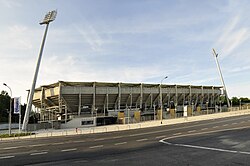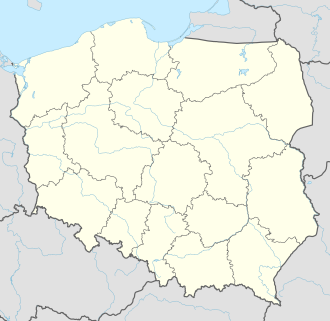Top Qs
Timeline
Chat
Perspective
2017 UEFA European Under-21 Championship
21st edition of the UEFA European Under-21 Championship From Wikipedia, the free encyclopedia
Remove ads
The 2017 UEFA European Under-21 Championship (also known as UEFA Under-21 Euro 2017) was the 21st edition of the UEFA European Under-21 Championship, a biennial international youth football championship organised by UEFA for the men's under-21 national teams of Europe. The final tournament was hosted in Poland for the first time, after their bid was selected by the UEFA Executive Committee on 26 January 2015 in Nyon, Switzerland.[1] The tournament took place from 16 to 30 June 2017.[2] Players born on or after 1 January 1994 were eligible for the tournament.
Remove ads
In March 2012, UEFA announced that the competition would take place in even numbered years from 2016 onwards.[3] In September 2013, UEFA announced its intention to continue holding the final tournament in odd numbered years following a request from its member national football associations.[4] On 24 January 2014, UEFA confirmed that the final tournament would be held in 2017 and that it would be expanded from 8 teams to 12.[5]
Remove ads
Hosts
The hosts were announced at a meeting of the UEFA Executive Committee in Nyon on 26 January 2015. In late April 2014, the Polish Football Association very strongly indicated the country has high chances to host the tournament. Bidding to welcome Europe's best youth teams was one of the reasons for Poland's withdrawal from the UEFA Euro 2020 race.[6]
Qualification
Summarize
Perspective
A total of 53 UEFA nations entered the competition (Gibraltar did not enter, as per usual), and with the hosts Poland qualifying automatically, the other 52 teams competed in the qualifying competition to determine the remaining 11 spots in the final tournament.[7] The qualifying competition, which took place from March 2015 to November 2016, consisted of two rounds:[8]
- Qualifying group stage: The 52 teams are drawn into nine groups – seven groups of six teams and two groups of five teams. Each group is played in home-and-away round-robin format. The nine group winners qualify directly for the final tournament, while the four best runners-up (not counting results against the sixth-placed team) advance to the play-offs.
- Play-offs: The four teams are drawn into two ties to play home-and-away two-legged matches to determine the last two qualified teams.
Qualified teams
The following 12 teams qualified for the final tournament.[9]
Note: All appearance statistics include only U-21 era (since 1978).
Final draw
The final draw was held on 1 December 2016, 18:00 CET (UTC+1), at the ICE Congress Centre in Kraków.[10][11] The 12 teams were drawn into three groups of four teams. The teams were seeded according to their coefficient ranking following the end of the qualifying play-offs, with the hosts Poland assigned to position A1 in the draw. Each group contained either the hosts or one team from Pot 1, one team from Pot 2, and two teams from Pot 3.[12][13]
Remove ads
Venues
On 7 June 2016, Polish Football Association selected six venues:[14]
The capacities listed below were the tournament capacity and does not necessarily reflect the maximum capacity of the stadiums.[15]
Match officials
Summarize
Perspective
In February 2017, UEFA selected nine referees and their teams for this tournament.
- 4th officials:
Remove ads
Squads
Each national team had to submit a squad of 23 players, three of whom had to be goalkeepers. If a player was injured or ill severely enough to prevent his participation in the tournament before his team's first match, he could be replaced by another player.[8]
Group stage
Summarize
Perspective
The group winners and the best runner-up advanced to the semi-finals.
- Tiebreakers
Teams were ranked according to points (3 points for a win, 1 point for a draw, 0 points for a loss), and if tied on points, the following tiebreaking criteria were applied, in the order given, to determine the rankings (Regulations Articles 18.01 and 18.02):[8]
- Points in head-to-head matches among tied teams;
- Goal difference in head-to-head matches among tied teams;
- Goals scored in head-to-head matches among tied teams;
- If more than two teams are tied, and after applying all head-to-head criteria above, a subset of teams are still tied, all head-to-head criteria above are reapplied exclusively to this subset of teams;
- Goal difference in all group matches;
- Goals scored in all group matches;
- Penalty shoot-out if only two teams had the same number of points, and they met in the last round of the group and are tied after applying all criteria above (not used if more than two teams had the same number of points, or if their rankings were not relevant for qualification for the next stage);
- Disciplinary points (red card = 3 points, yellow card = 1 point, expulsion for two yellow cards in one match = 3 points);
- UEFA coefficient for the final draw.
All times are local, CEST (UTC+2).[16]
Group A
Group B
Group C
Ranking of second-placed teams
Source: UEFA
Rules for classification: 1) points; 2) goal difference; 3) goals scored; 4) disciplinary points; 5) coefficient (Regulations Article 18.03).[8]
Rules for classification: 1) points; 2) goal difference; 3) goals scored; 4) disciplinary points; 5) coefficient (Regulations Article 18.03).[8]
The match-ups of the semi-finals depended on which runner-up qualified (Regulations Article 17.02):[8]
Scenario according to the qualified team
Remove ads
Knockout stage
Summarize
Perspective
In the knockout stage, extra time and a penalty shoot-out were used to decide the winner if necessary.[8]
On 2 May 2016, the UEFA Executive Committee agreed that the competition would be part of the International Football Association Board's trial to allow a fourth substitute to be made during extra time.[18]
Bracket
| Semi-finals | Final | |||||
| 27 June – Tychy | ||||||
| 2 (3) | ||||||
| 30 June – Kraków | ||||||
| 2 (4) | ||||||
| 1 | ||||||
| 27 June – Kraków | ||||||
| 0 | ||||||
| 3 | ||||||
| 1 | ||||||
Semi-finals
Final
Remove ads
Goalscorers
There were 65 goals scored in 21 matches, for an average of 3.1 goals per match.
- 5 goals
- 3 goals
- 2 goals
- 1 goal
 Tomáš Chorý
Tomáš Chorý Marek Havlík
Marek Havlík Michael Lüftner
Michael Lüftner Patrik Schick
Patrik Schick Michal Trávník
Michal Trávník Lucas Andersen
Lucas Andersen Marcus Ingvartsen
Marcus Ingvartsen Tammy Abraham
Tammy Abraham Lewis Baker
Lewis Baker Alfie Mawson
Alfie Mawson Jacob Murphy
Jacob Murphy Nathan Redmond
Nathan Redmond Nadiem Amiri
Nadiem Amiri Serge Gnabry
Serge Gnabry Marc-Oliver Kempf
Marc-Oliver Kempf Max Meyer
Max Meyer Felix Platte
Felix Platte Mitchell Weiser
Mitchell Weiser Domenico Berardi
Domenico Berardi Lorenzo Pellegrini
Lorenzo Pellegrini Andrea Petagna
Andrea Petagna Nikola Gjorgjev
Nikola Gjorgjev Kire Markoski
Kire Markoski Dawid Kownacki
Dawid Kownacki Patryk Lipski
Patryk Lipski Łukasz Moneta
Łukasz Moneta Bruno Fernandes
Bruno Fernandes Gonçalo Guedes
Gonçalo Guedes Edgar Ié
Edgar Ié Daniel Podence
Daniel Podence Uroš Đurđević
Uroš Đurđević Mijat Gaćinović
Mijat Gaćinović Jaroslav Mihalík
Jaroslav Mihalík Pavol Šafranko
Pavol Šafranko Ľubomír Šatka
Ľubomír Šatka Martin Valjent
Martin Valjent Gerard Deulofeu
Gerard Deulofeu Sandro
Sandro Iñaki Williams
Iñaki Williams Denis Suárez
Denis Suárez Jacob Une Larsson
Jacob Une Larsson Carlos Strandberg
Carlos Strandberg
Source: UEFA.com[20]
Remove ads
Awards
The following awards were given at the conclusion of the tournament:
- Player of the Tournament:
 Dani Ceballos[21]
Dani Ceballos[21] - Golden Boot:
 Saúl[22]
Saúl[22]
Team of the tournament
After the tournament, the Under-21 Team of the Tournament was selected by the UEFA Technical Observers.[23]
Sponsorship
|
References
External links
Wikiwand - on
Seamless Wikipedia browsing. On steroids.
Remove ads







